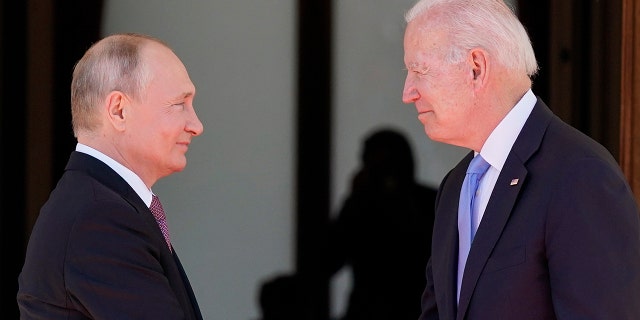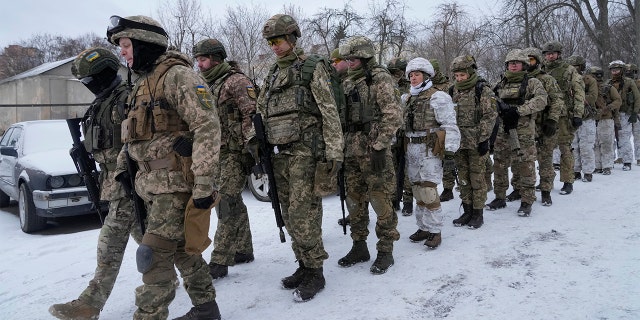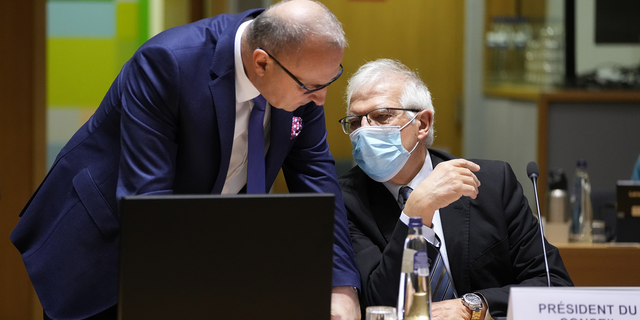NEWYou can now listen to Fox News articles!
CAPITOL HILL – When war drums sound in Europe, they reverberate inside the Washington Beltway.
The Biden administration says it won’t allow the threat by Russian President Vladimir Putin to invade Ukraine go unchallenged. The Pentagon is shifting 8,500 troops to "heightened alert" to deter a potential Russian invasion of Ukraine.
"Missions have not been assigned," said Pentagon spokesman John Kirby. "There is not a mission, per se."
The U.S. will measure any response.
"There (are) not going to be any American forces moving into Ukraine," said President Biden.

President Biden and Russian President Vladimir Putin arrive to meet at the Villa la Grange in Geneva, Switzerland, June 16, 2021. (AP Photo/Patrick Semansky, File)
RUSSIA THREATENS ‘APPROPRIATE MEASURES’ IF WEST' RESPONSES TO DEMANDS AREN'T CONSTRUCTIVE
The administration is still reeling from what is perhaps the most significant debacle of Biden’s 53 weeks in office: the botched withdrawal of American forces from Afghanistan. Moreover, the U.S. must tread carefully when directly infusing itself into a conflict with Russia. A fraught, Cold War history lingers more than three decades after the Soviet Union dissolved.
A miscalculation or mistaken provocation holds dire consequences.
The U.S. is dispatching American forces to the easternmost reaches of NATO: Estonia, Latvia, Lithuania, Poland and Romania. This is both a threat and a deterrence.
But we’ve been down this road before.
Putin invaded Crimea – a portion of Ukraine – shortly after Russia hosted the Sochi Winter Olympics in 2014. Then-Ukrainian President Petro Poroshenko came to Washington a few months later to address a Joint Session of Congress. Poroshenko pleaded with U.S. lawmakers to aid Ukraine.
"They need more military equipment, both lethal and nonlethal," said Poroshenko to lawmakers. "Blankets and night-vision goggles are also important. But one cannot win the war with blankets."
Ukraine finally scored $70 million in nonlethal aid from the U.S. and tens of millions to help the nation harden its borders. But Poroshenko indicated that in 2014, former President Obama wasn’t willing to do much else.
Poroshenko made an ominous prediction to lawmakers.
"These threats now challenge Europe," Poroshenko said at the Capitol. "If (the Russians) are not stopped now, they will cross European borders and spread, absolutely, throughout the world."
BIDEN IS INCAPABLE OF MEETING THE DANGERS FROM PUTIN AND XI WHO SMELL WEAKNESS
So the U.S. is trying to decide what to do about Ukraine. Congress usually wades into these affairs at some point.
Kirby said he was "not aware" of any provision that would require congressional sign-off to justify any engagement of American forces in a defensive posture outside of Ukraine. But those who study congressional "war powers" always pay attention once any administration begins moving around forces abroad in anticipation of a potential conflict.
Let’s start with the basics.
Article I, Section 8 of the Constitution requires an authorization of Congress to "declare war." Article II, Section 2 of the Constitution says that "the president shall be Commander in Chief of the Army and Navy of the United States, and of the Militia of the several States, when called into the actual Service of the United States."
These two passages reflect the inherent tension embedded in the Constitution over which branch of government actually controls the military when it comes to conflict. Certainly the U.S. is not at "war" with Russia. And, Congress hasn’t actually "declared war" since it did so with Romania in 1942. But Congress routinely approves resolutions giving its blessing for the use of the military overseas.
Lawmakers approved the Gulf of Tonkin Resolution in 1964, authorizing U.S. intervention in Vietnam. Congress OK'd "Authorizations for Use of Military Force" (AUMF’s) to justify combat in Afghanistan, and, more broadly, global counterterrorism operations in 2001. Congress also OK'd an AUMF in 2002 for the war in Iraq in 2003.
The administrations of Presidents George W. Bush, Obama, Trump and, to a lesser degree, Biden, have all relied on the 2001 and 2002 AUMFs as rationale for a litany of overseas military engagements. Some are close to the original, congressional intent. Others stray further afield. That calls into question the constitutionality of such operations.

Members of Ukraine's Territorial Defense Forces, volunteer military units of the Armed Forces, train in a city park in Kyiv, Ukraine, Saturday, Jan. 22, 2022. Dozens of civilians have been joining Ukraine's army reserves in recent weeks amid fears about Russian invasion. (AP Photo/Efrem Lukatsky)
Overall, the U.S. has leaned on the 2001 AUMF as pretext for military efforts in Djibouti, assistance in Niger, and varying degrees of combat or support in Afghanistan, Somalia, Yemen, Syria, Libya and Iraq.
This is why some lawmakers of both parties question the legitimacy of the U.S. repeatedly recycling an authorization that is now more than two decades old and approved while Ground Zero and the Pentagon still smoldered after 9/11.
Congress actually came close to repealing the 2002 AUMF. The House voted last year 268-161 to repeal that measure. Sens. Tim Kaine, D-Va., and Todd Young, R-Ind., crafted a repeal plan for the Senate. The Senate expected to vote in December to formally repeal the 2002 AUMF. But that vote got lost in the December chaos of Capitol Hill.
So Kirby says an AUMF isn’t required for any current operations linked to Ukraine. And, even if it was clear an AUMF was necessary, it’s apparent that repurposing the 2001 and 2002 AUMFs for any engagements are bridges too far.
But Congress could infuse itself into this subject with various debates on resolutions regarding U.S. policy toward Russia, Ukraine or the use of troops.
The U.S. and NATO engaged in the Balkans as the former Yugoslavia splintered in the 1990s.

European Union foreign policy chief Josep Borrell, right, speaks with Croatia's Foreign Minister Gordan Grlic Radman during a meeting of EU foreign ministers at the European Council building in Brussels, Belgium, on Monday. (AP/Virginia Mayo)
SEXTON: DEMOCRATS UNINTERESTED IN US BORDER, BUT THEY ARE FOCUSED ON UKRAINE'S BORDERS
Congress sent mixed messages about U.S. military activity in the Balkans back then. President Clinton decided to send troops to help enforce peace in Bosnia after the former Yugoslavia devolved into civil war. The Senate approved a measure saying it supported the troops involved in the mission. But senators voted specifically against the fact that Clinton elected to send troops overseas.
Then, in the ultimate fig leaf, the House rejected the president’s decision to send troops. But the in the same resolution, the House indicated it would be supportive of forces overseas.
The president sought the support of Congress to boost "the morale of our troops."
In 1999, the Senate voted 58-41 to back the U.S. working with NATO to bomb Serbia as the Balkan wars continued. The leadership in Belgrade oppressed Kosovo. That prompted NATO to act. But the House shocked the Clinton White House. On a 213-213 vote, the House defeated the Senate resolution to endorse the NATO airstrikes. By rule, tie votes fail.
CLICK HERE TO GET THE FOX NEWS APP
The House and Senate are both out of session this week. But Congress historically makes noise about such military deployments and requests information about the goals of the mission. Lawmakers on the left and right form an odd coalition about presidential war powers and congressional authority to keep watch over the executive branch. This is augmented by the fact that Congress granted President George W. Bush a blank check with the 2001 AUMF.
Moreover, one could see a scenario where Congress weighs in on potential military action overseas in an upcoming omnibus spending bill to fund the government by Feb. 18. Control of the purse strings represents the ultimate power in Congress. Lawmakers could either tack on money for Ukraine aid – or place strictures on what the U.S. is allowed to do militarily.
The war drums overseas always echo inside the halls of Capitol Hill. It’s unclear what may unfold in Ukraine and what that means for the U.S. military. But Congress usually sends a legislative signal indicating its agreement or dissent.
Article From & Read More ( Reporter’s Notebook: Russia-Ukraine tensions escalate, and Congress may weigh in - Fox News )https://ift.tt/33Tu37y
World
Bagikan Berita Ini














0 Response to "Reporter’s Notebook: Russia-Ukraine tensions escalate, and Congress may weigh in - Fox News"
Post a Comment